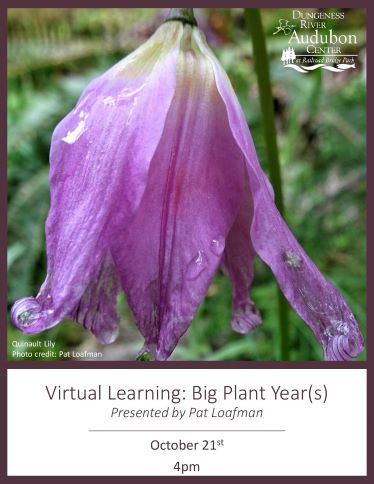
Big Plant Year
Western Washington is one of the most biologically diverse places in the United States. From sea level to the alpine, from rainforest to rainshadow, from rich to rocky soils, this region hosts thousands of native and non-native plant species that have evolved in response to this unique setting.
Can you imagine trying to find and photograph each one?
Pat Loafman, Olympic National Park, Biological Technician and one of the most knowledgeable naturalists in the region, set off for a year, which turned into four, trying to see and photograph every native and exotic plant species along the Coast Range of WA State. This adventure was in coordination with writing a book about flora of the area.
The River Center is very excited for Pat to be the next speaker in our virtual learning series!
Come hear about the challenges of taking on the massive task of creating a plant guide, and some of the insight he has learned along the way!
One of the major threats facing our native plant species is habitat loss due to population growth and development. You can support our local diversity by sharing your space and adding some of these species to your own property!
Due to popular demand at our Seedbomb Stand last week, we are bringing it back for another round!
This time, you can order ahead! If you would like to place an order, please respond to this email ([email protected]) and let me know how many and which mix you would like. The options are listed below…
– Open/ Sunny area
– Gravelly/ Disturbed area
– Shade/ Understory
– Heavy clay soil
– Wet spots that dry in summer
Seedbombs are $5 each, or 5 for $20.
Look out for another email later this week that will include the date of the next stand and pick up times.
Thanks!(Seedbombs are a mixture of compost, clay and (native) seeds. Humans can assist nature in seed dispersal by tossing or dropping seedbombs in barren or unused areas.)


